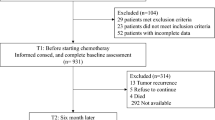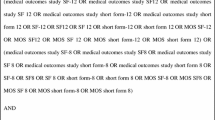Abstract
In this study, we assessed the reliability and construct validity of the SF-36, Turkish version on 419 cancer patients. Cronbach’s α coefficients surpassed the 0.70 criterions for all subscales indicating good internal consistency. Results of the test–retest method showed that the stability coefficients for the eight subscales of the SF-36 ranged between 0.81 and 0.94. Principal components factor analysis with varimax rotation confirmed the presence of seven factors in the SF-36: physical functioning, role limitations due to physical and emotional problems, mental health, general health perception, bodily pain, social functioning, and vitality. In conclusion, the Turkish version of the SF-36 is a suitable instrument that could be employed in cancer research in Turkey.
Similar content being viewed by others
References
SG Parker SM Peet C Jagger M Farhan CM Castleden (1998) ArticleTitleMeasuring health status in older patients: The SF-36 in practice Age Ageing 27 13–18 Occurrence Handle9504361
P Hobson B Bhowmick J Meara (1997) ArticleTitleUse of the SF-36 questionnaire in cerebrovascular disease Stroke 28 464–465
Atagoz K. Quality of life among patients with chronic obstructive lung disease. Unpublished master’s thesis, University of Dokuz Eylul, Izmir, Turkey, 1998.
S Aydı ın T Yavuz H Duven (2002) ArticleTitleEffects of coronary by-pass operations on quality of life in early stage in patients who over 65 years old Turk J Geriatr 5 64–67
AY Chen R Frankowski J Bishop-Leone T Hebert S Leyk J Lewin H Goepfert (2001) ArticleTitleThe development and validation of a dysphasia-specific quality-of-life questionnaire for patients with head and neck cancer: The Anderson dysphasia inventory Arch Otolaryngol Head Neck Surg 127 870–876 Occurrence Handle11448365
C Jenkinson A Coulter L Wright (1993) ArticleTitleShort form 36 (SF-36) health survey questionnaire: Normative data for adults of working age Br Med J 306 1437–1440
CA McHorney JE Ware JF Lu JD Sherbourne (1994) ArticleTitleThe MOS 36-item Short Form Health Survey III: Tests of data quality, scaling assumptions, and reliability across diverse patient groups Med Care 32 40–66 Occurrence Handle8277801
R Pinar S Cinar M Issever M Albayrak S Ilhan (1995) ArticleTitleQuality of life in ESRD: Influence of haemodialysis and renal transplantation Cı ınar Hemsire Derg 1 1–5
Pinar R. Self-reported quality of life and effecting factors in patients with diabetes mellitus. Unpublished doctoral dissertation, University of Istanbul, Istanbul, Turkey, 1995.
JE Ware CD Sherbourne (1992) ArticleTitleThe MOS 36 item short form health survey (SF 36) Med Care 30 473–483 Occurrence Handle1593914
JE Ware (1993) ArticleTitleMeasuring patients’ views: The optimum outcome measure Br Med J 306 1429–1430
NK Aaronson M Muller PD Cohen et al. (1998) ArticleTitleTranslation, validation, and norming of the Dutch language Version of the SF-36 health survey in community and chronic disease populations J Clin Epidemiol 51 1055–1068 Occurrence Handle10.1016/S0895-4356(98)00097-3 Occurrence Handle9817123
JE Ware (1989) User’s Manual/SF 36 Health Status Questionnaire. New England Medical Center, The Health Institute Boston, MA
Fi şek G. Personal communication, 2002.
Gandek B. Psychometric analysis of the SF-36 Health Survey: Turkish data. Unpublished manuscript, 1997.
LJ Cronbach (1951) ArticleTitleCoefficient alpha and the internal structure of tests Psychometrika 16 297–334
PE Shrout JL Fleiss (1979) ArticleTitleIntraclass correlations: Uses in assessing interrater reliability Phychol Bull 36 420–428
DL Streiner GR Norman (1989) Health Measurement Scales: A Practical Guide to Their Development and Use Oxford University Press Oxford
K Ozdamar (1999) Statistical Data Analysis with Standard Statistical Programs EditionNumber2nd ed Kaan Publishing Eskisehir, Turkey
IT Jolliffe (1986) Principal Component Analysis Springer New York
JE Ware B Gandek (1994) ArticleTitleIQOLA Project Group. The SF-36 Health Survey: Development and use in mental health research and the IQOLA project Int J Ment Health 23 49–73
M Sullivan J Karlsson JE Ware (1995) ArticleTitleThe Swedish SF-36 Health Survey-I. Evaluation of data quality, scaling assumptions, reliability and construct validity across general populations in Sweden Soc Sci Med 41 1349–1358 Occurrence Handle10.1016/0277-9536(95)00125-Q Occurrence Handle8560302
JC Nunnaly IH Bernstein (1994) Psychometric Theory McGraw-Hill New York
PJ Brink MJ Wood (1989) Advanced Design in Nursing Research Sage Publications London
AM Garratt DA Ruta MI Abdalla JK Buckingham IT Russell (1993) ArticleTitleThe SF-36 health survey questionnaire: An outcome measure suitable for routine use within the NHS? Br Med J 306 1440–1444
Author information
Authors and Affiliations
Corresponding author
Rights and permissions
About this article
Cite this article
Pinar, R. Reliability and construct validity of the SF-36 in Turkish cancer patients. Qual Life Res 14, 259–264 (2005). https://doi.org/10.1007/s11136-004-2393-3
Accepted:
Issue Date:
DOI: https://doi.org/10.1007/s11136-004-2393-3




